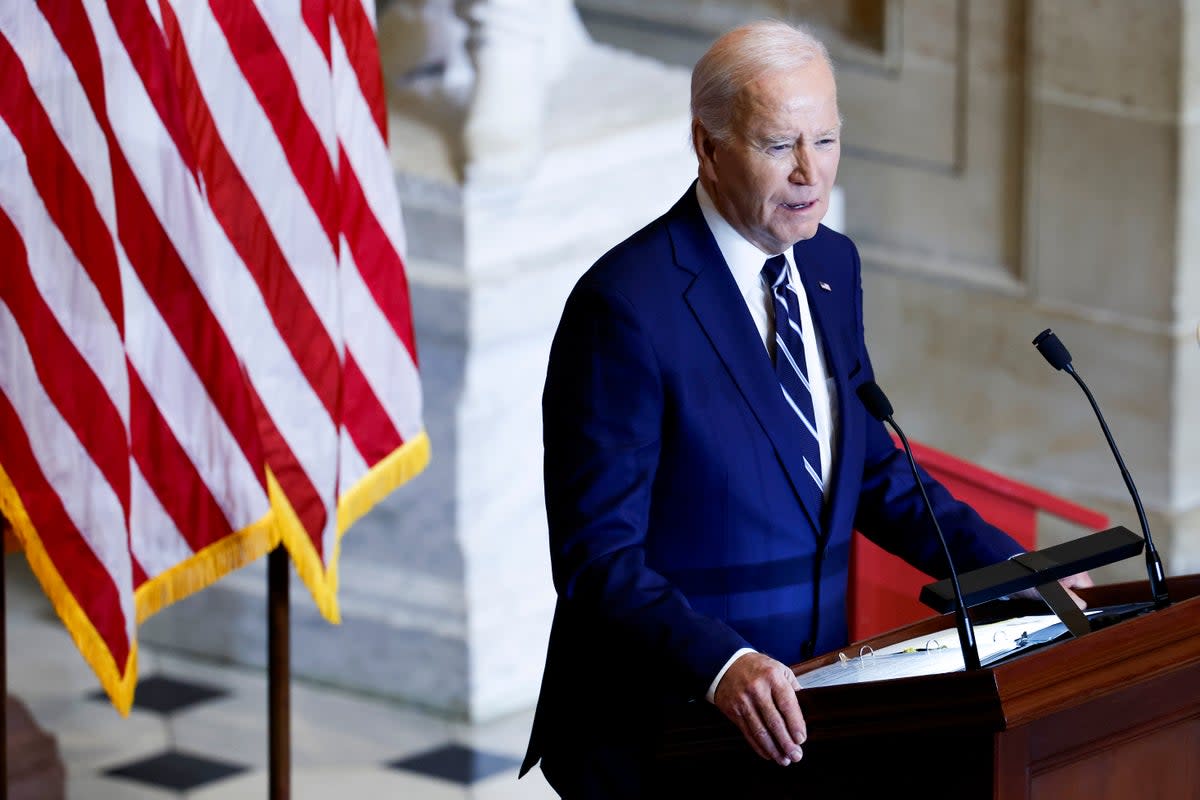Jobs are hot, the economy is doing well. So why are people still sour on Joe Biden?

President Joe Biden got another boost on Friday when the Bureau of Labor Statistics announced that the US economy has added 353,000 jobs and that unemployment remains at a steady 3.7 per cent.
And jobs aren’t the only part of the economy that look great right now.
Hourly earnings grew by 4.5 per cent in the past year, outpacing inflation for the past 12 months. This means that even as prices rise, Americans are taking more money home.
Last month, the Bureau of Economic Analysis announced that gross domestic product grew by 3.3 per cent in the fourth quarter of last year. By comparison, Germany’s economy contracted in the fourth quarter of 2023 and looks like it might head to a recession while Canada’s grew by 0.3 per cent in the fourth quarter.
Treasury Secretary Janet Yellen, who also served as chairwoman of the Federal Reserve, also said in a speech last month that, in other countries, real wages had declined and that, compared to the Great Recession of the late 2000s, labour force participation rates and employment rates have recovered fairly rapidly.
So why do people still feel so lousy when it comes to Mr Biden’s handle on the economy? A new CNN poll released Friday showed only 37 per cent of Americans approve of how Mr Biden is handling the economy. That number could be fatal for the president as he faces reelection against former president Donald Trump.
Not only do people disapprove of Mr Biden’s management of the economy; they think he is actively making it worse. The same CNN poll showed that 55 per cent think that his policies have actually worsened economic conditions in the country.
Tellingly, Mr Biden has largely abandoned using the term “Bidenomics” that he began using in the summer of last year – likely a sign that his campaign knows that voters don’t feel the recovery, no matter how much the data shows the US is faring better than other countries.
There are a number of reasons for this. First and foremost, while inflation has not risen as much as it did during 2022 when inflation busted records not seen since the 1980s, it still ticks upward. That means that even though inflation isn’t rising, Americans still see higher prices, particularly at the grocery store, than they did before the Covid-19 pandemic.
And since inflation started to rise shortly after Mr Biden took office and signed the American Rescue Plan – which included stimulus checks and expanded unemployment insurance – it’s easy to think that those policies caused inflation.
A Federal Reserve study last year found that that Covid stimulus, which Mr Trump also passed, did contribute partially but not entirely to soaring prices in 2022, though it also acknowledged that stimulus “supported a strong economic rebound” like the one seen today. Indeed, the US was far more generous than many other countries with its economic relief programs during the pandemic.
Similarly, Americans also disapprove of how he’s handling other policies, as 34 per cent of Americans approve of the war between Israel and Hamas while 70 per cent disapprove of how he’s handling immigration. The latter is a major reason why Mr Biden has pushed aggressively for Congress to pass a bipartisan agreement that would not only provide aid to Ukraine and Israel, but also severely restrict immigration.
At the same time, there are signs that Americans’ views about the economy are far less bleak than they were only a few months ago. In July 2023, 20 per cent of Americans thought that the economy was starting to recover from problems it faced a few years ago; that number is now at 26 per cent. Meanwhile, 26 per cent of Americans now think that the economy has not improved but conditions have stabilised and things are getting worse, down two points from July. Meanwhile, a thin majority of 51 per cent of Americans thought that the economy was still in a downturn in 2023 but that number is down to 48 per cent.
Those shoots of optimism are likely to continue to improve if Americans continue to see a good job market, especially if they can change jobs and not lose everything.
In addition, Mr Biden will also likely continue to run heavily on the economy, especially given the fact that the economic recovery he oversees is far more robust than the one his former boss Barack Obama oversaw when he sought re-election in 2012 and Mr Biden thundered that “Osama bin Laden is dead and General Motors is Alive”.
Mr Biden has also leaned heavily into his support from American labour, namely the endorsement he received from the United Auto Workers after he became the first president to walk a picket line with striking employees. Shawn Fain, the president of the UAW, has gone on television numerous times to defend Mr Biden’s support for unions in contrast to Mr Trump – who brought not only white, non-college-educated voters into the GOP fold, but also non-white, working-class voters without degrees, particularly men.
Whether it will be enough for Mr Biden to stave off Mr Trump is another story.
